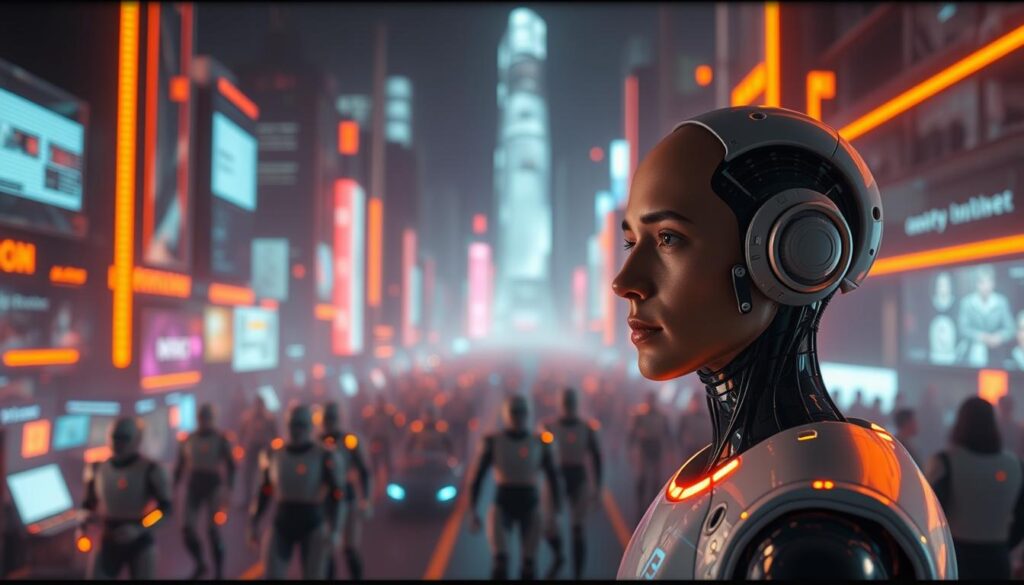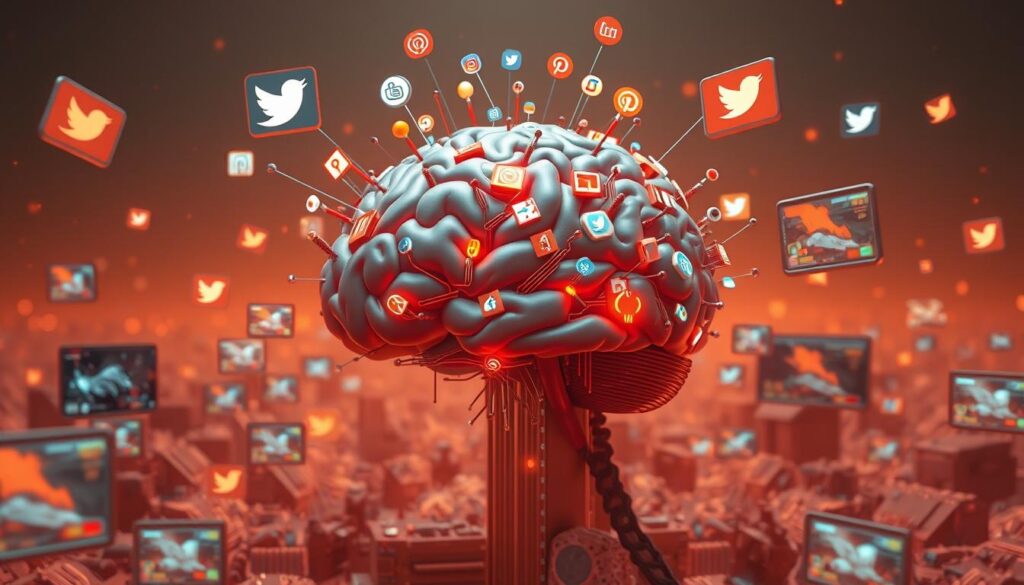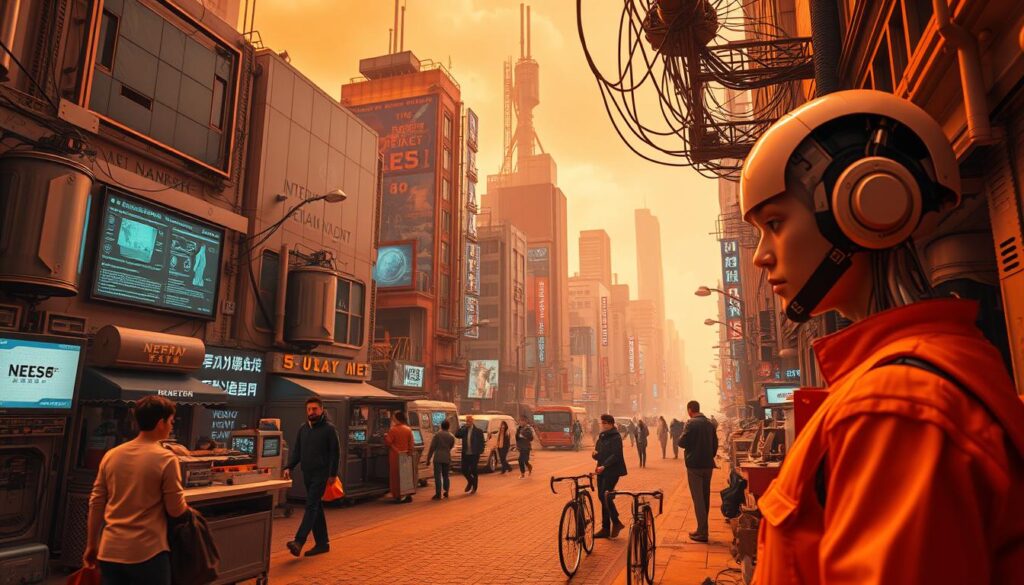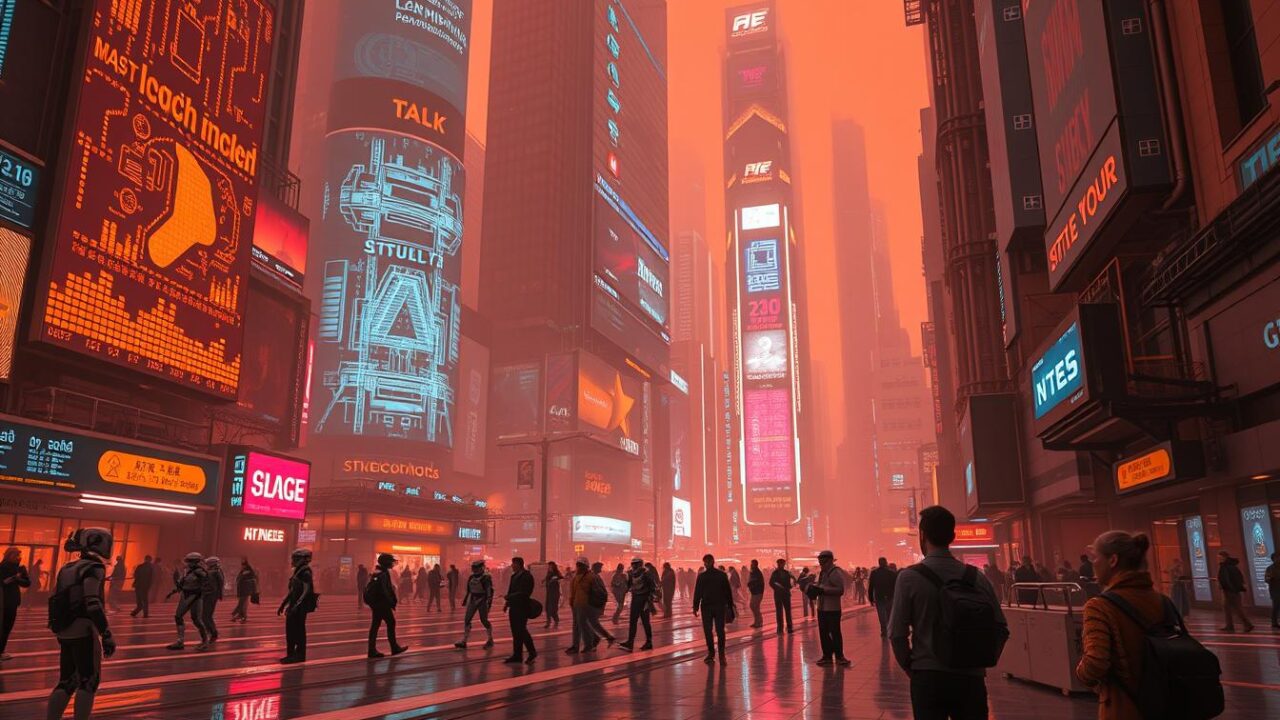A staggering 75% of all resumes in the United States are now read by AI, says Zip Recruiter’s CEO Ian Siegel. This statistic shows how much artificial intelligence is changing our lives. It makes us wonder about its effects on society and our intelligence.
AI is everywhere, from job apps to social media. We need to think about how it might change us. It could affect how we think and grow as a society.
Today, many people rely on AI for quick answers. This means we use less of our own brain power. Our brains use a lot of energy, so using AI might make us less sharp.
AI brings both good and bad changes. It could help us think better, but it might also make us lazy. The key is finding a balance between AI and human work.
As AI becomes more part of our lives, we face both risks and chances. It can change how we find jobs and create art. By understanding these changes, we can prepare for a future where AI and humans work together.
Key Takeaways
- 75% of US resumes are now processed by AI, highlighting its growing influence
- The concept of “outsourced cognition” is changing how we think and communicate
- AI serves as a brain-energy-saving mechanism, potentially affecting our cognitive abilities
- The balance between AI and human collaboration is crucial for future cognitive development
- Artificial intelligence presents both opportunities and challenges for society
- Understanding AI’s impact is essential for preparing for a future of human-AI coexistence
The Evolution of AI and Its Impact on Human Intelligence

AI has quickly changed our lives and how we think. We now wonder about ai governance and ethics. These questions help us understand how to use these powerful tools wisely.
Technology’s Role in Cognitive Development
Technology has always shaped our minds. The “Flynn Effect” showed IQ scores went up in the 20th century. But, recent studies say this might be slowing down or even going backwards in some groups.
AI Integration in Daily Life
AI is everywhere in our daily lives. Almost all developers use AI for work, and many bloggers use it to create content. This shows how important human-centered ai design is. It helps make sure AI helps us, not just replaces us.
Diminishing Need for Mental Effort
AI doing our thinking for us is a worry. With AI doing first drafts for 21% of bloggers and translating 57% of internet content, we need to focus on ai transparency and accountability. This way, we can keep using AI without losing our own thinking skills.
“The symbiosis between human intelligence and AI presents both opportunities and challenges. It’s crucial to navigate this relationship thoughtfully to avoid potential pitfalls like artificial brain rot or model collapse.”
As AI becomes more part of our lives, we must think about its long-term effects on our minds. Finding a balance between using AI and keeping our brains sharp is vital. Learn more about AI’s hidden costs here.
Social Media, AI Algorithms, and Mental Deterioration

The rise of social media and AI algorithms has raised concerns about their impact on our minds. As we move forward with AI in the workplace, we wonder how these technologies affect our thinking and society.
Impact on Attention Spans and Deep Thinking
Social media’s fast-paced content, thanks to AI, is changing how we focus. We often scroll endlessly, taking in small pieces of info without deep thought. This could harm our ability to concentrate and think deeply.
The Role of AI in Social Media Addiction
AI algorithms help keep us hooked on social media. They study our habits and preferences to serve us content that keeps us coming back. Experts say AI’s role in our digital lives will grow, possibly making addiction worse by 2035.
Consequences for Creative and Critical Thinking
Too much AI-curated content might hurt our creative and critical thinking. As we rely more on pre-filtered info, we risk losing our ability to think for ourselves and come up with new ideas. This could affect democracy and human rights in big ways.
“The standardization of language by AI may simplify unique stylistic features and lead to a reduction in how individuals express concepts and transmit knowledge.”
To tackle these issues, we need to find a balance between tech progress and keeping our minds sharp. This balance is key to creating a future where AI boosts our mental abilities, not hinders them.
Will AI Bring Human Race to Idiocracy?

Artificial intelligence is advancing fast, making us wonder about its effects on society. As AI gets smarter, worries grow about its role in lowering human smarts. This situation reminds us of the “Idiocracy” idea seen in movies.
Education has changed a lot over time, from apprenticeships to mandatory school. Today’s students, with digital info always at hand, doubt old learning ways. With AI’s growth, how we learn and think might change a lot.
“If AGI/ASI arrived tomorrow and nobody had to work, many people would choose entertainment and other mindless, time-wasting activities.”
AI’s influence goes beyond school. It threatens jobs that need knowledge and skills. This could lead to a world where one big company rules, like in Wall-E.
Astrophysicist Michael Garrett thinks advanced AI might stop civilizations from growing. He believes AI could make us lose our drive for discovery and progress.
- AI could lead to increased cognitive offloading
- Entertainment might be prioritized over intellectual pursuits
- Workforce disruption may alter societal structures
To avoid AI making us all less smart, we need to keep up with tech but also value human thinking. We should update how we learn, keep our minds sharp, and limit AI’s role in our lives.
The Workplace Revolution: AI’s Role in Job Displacement
AI is changing the workplace. It’s altering how we work and what skills we need. The future of work with AI is both promising and challenging.
Automation of Knowledge-Based Work
AI is now doing tasks once thought only for humans. It’s handling complex jobs like data analysis and customer service. This change is affecting many industries.
For example, Palantir Technologies has partnered with defense companies to use AI for data. This shows how even specialized fields are embracing automation.
Economic and Social Implications
The rise of AI in the workplace is causing economic changes. While some jobs disappear, new ones are created. But this change isn’t easy for everyone.
Companies like Sainsbury’s and Tesco are making millions from AI-driven data analysis of shopping habits. This trend shows how AI is creating new revenue streams while potentially displacing traditional roles.
Skills Obsolescence and Retraining Challenges
As AI takes over more tasks, many workers find their skills outdated. The future of work with AI demands continuous learning. Industries are scrambling to retrain their workforce.
Yet, the pace of change is dizzying. From healthcare to finance, professionals must adapt or risk being left behind.
“The workplace is evolving faster than ever. We must embrace AI as a collaborator, not a replacement, to thrive in this new era.”
The workplace revolution driven by AI is undeniable. It’s reshaping job markets, challenging our adaptability, and redefining what it means to be valuable in the workforce. As we navigate this new landscape, the key lies in fostering AI and human collaboration to create a balanced and productive future of work.
AI’s Impact on Human Learning and Development
The world of education is changing fast with the help of artificial intelligence. Over the last ten years, we’ve moved from focusing on computer science to AI skills. This change makes us think about the ethics of AI in schools.
Nvidia CEO Jensen Huang says programming is less important now because of AI. But Code.org wants computer science to be a must in U.S. high schools. Their TeachAI program adds AI to education, showing how important AI literacy is.
Today’s technology needs new skills. Huang says we need to learn more about AI in many fields. This change makes us rethink how we teach and highlights the need for AI that focuses on people.
“AI is closing the technology gap, but we must ensure it enhances rather than replaces human learning and creativity.”
AI’s influence isn’t just in tech. It’s also changing literature and art. AI is finishing works by dead authors and making new art. This brings up big questions about creativity and who owns the work in an AI world.
- AI challenges traditional skill sets
- Education systems are adapting to include AI literacy
- Ethical concerns arise in creative fields
As AI changes how we learn, finding a balance is key. We need to mix AI’s power with human creativity and thinking. The future of learning is about combining AI with human skills.
The Dangers of Over-Reliance on Artificial Intelligence
As AI gets better, we face new risks and challenges. Our growing dependence on AI worries us about our thinking and social skills.
Loss of Problem-Solving Abilities
Generative AI models can make content fast, but they don’t really understand. This might make us worse at solving problems. We might rely too much on AI, making us less able to think for ourselves.
Decreased Human Decision-Making Capabilities
AI systems like ChatGPT work based on rules, not understanding. They don’t get emotions or context like we do. Using them too much could make us worse at making decisions. We might lose the ability to make complex choices.
Social and Emotional Intelligence Degradation
AI-generated content often uses common phrases. This could make our language less diverse. Our ability to express feelings and connect with others might suffer. We might lose the unique ways we communicate.
“The standardization of language by AI models may lead to a homogenization of thought processes and understanding of the world.”
To tackle these problems, we need more transparency and accountability in AI. We must understand AI’s limits and keep our human skills sharp. Finding a balance between AI use and human interaction is vital for our thinking and social health.
Safeguarding Human Intelligence in an AI-Driven World
As AI gets better, protecting human smarts is key. We must balance tech progress with keeping human brains sharp. Just as the Titanic disaster led to safer seas, we must be careful with AI to avoid problems.
Human-centered AI design is a big help. It puts people first, making sure AI helps, not hurts. It’s like making sure every ship has enough lifeboats for everyone – we need to get ready for AI’s effects on us.
Teaching is also very important. Schools should teach kids to think critically, be creative, and understand emotions. These skills are our safety nets in a world dominated by AI. For example, even though Google uses AI for 25% of its code, humans still lead in innovation and solving problems.
“AI should enhance human capabilities, not diminish them. We must design systems that work alongside humans, not replace them.”
The AI world is growing fast, with OpenAI getting $6.6 billion and PwC saying AI will add $15.7 trillion to the global economy. This shows we need to act fast. Like the Carpathia saving Titanic survivors, we must help those affected by AI, making sure no one is left out in this big change.
Balancing Progress with Human Cognitive Preservation
AI is changing our world, and we must protect our minds. We need good rules for AI to keep our brains sharp and our tech advancing.
Educational System Adaptations
Schools need to change to get ready for AI. They should teach us to think deeply and be creative. A study found that adding AI to education boosted problem-solving by 30%.
Maintaining Human Agency and Critical Thinking
We must keep making choices on our own. We should question AI and know its limits. This way, we stay in control and support democracy.
Creating Boundaries in AI Integration
Limiting AI use is key to not rely too much on it. Companies with “AI-free zones” see more creativity and teamwork. These limits help keep our minds sharp while using AI.
In just 60 days, many people started talking about this. User johnnyanmac got a lot of responses. The thread had 25 comments, most in the first week. This shows how important it is to balance AI with our brains in public talks.
Conclusion
Artificial intelligence is changing fast, leading to big debates about its effects on society and our minds. We wonder if AI will lead us to idiocracy. It’s important to look at both the good and bad sides of AI.
Sundar Pichai, Google’s CEO, thinks AI is more important than electricity or fire. He sees it as a game-changer. Since Alan Turing asked if machines could think in 1950, AI has grown a lot.
John McCarthy started a project in 1955 to make machines that could talk and solve hard problems. This has raised worries about AI’s effect on our thinking and choices.
The path of AI has seen ups and downs. It has moved from old ways to new machine learning. This journey has shown us how hard it is to make AI understand and handle uncertainty.
We need to find a balance between AI’s growth and keeping our minds sharp. By changing how we learn, keeping our control, and setting limits, we can use AI wisely. The future is about making AI better, not worse, for us.
Want to hire me as a Consultant? Head to Channel as a Service and book a meeting.

